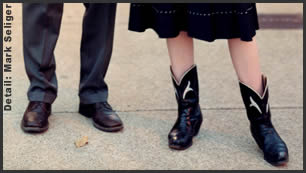
The Ghostly
Ones (continued)
Welch is a figure of some controversy, and she wishes she weren't. Some people like to say that as the daughter of musicians in Los Angeles she has no right to play music they regard as reserved for people who grew up in poverty or, anyway, among laborers.
In response, Rawlings likes to bring up Ernest Hemingway. "You read 'The Old Man and the Sea,' and you like it," he says. "Then you find out that not only is the man who wrote it not a commercial fisherman, he isn't even a Cuban. Do you not like it now?" Assertions about who belongs in the academy and who doesn't are always partisan, but in Welch's case none can be made confidently. There are complications that involve the issue of identity in a fundamental and enigmatic way. Welch says that the first time she heard bluegrass music she felt stirred as she never had by any other music. She has said that it makes no sense that she plays relic music deeply influenced by a part of the country she did not live in until she was grown. More than a few of her songs, for example, have the harsh modal structure of the ballads sung in the mountains of North Carolina in the nineteenth century. Her reaction might plausibly reflect her having sung folk songs as a girl and played the guitar at school, and a pleasure that surfaced when she was reminded of it--a sense memory, that is. In any case, to explain the anomaly posed by the difference between her upbringing and her tastes she has told interviewers, somewhat sheepishly, that she has wondered whose blood runs through her veins. She has even considered which musicians might have passed through New York in 1967. She has imagined her father as Bill Monroe, the founder of bluegrass, or as Levon Helm, the drummer in the Band, who was from Arkansas. After all, the first instrument she played was the drums, and now and then she still plays them.
Welch's parents claimed her the day after she was born, and, honoring rules imposed on the adoption, they sent a friend to the hospital to collect her. Over the years, they have learned two things about Welch's mother and father, which they told Welch while she was visiting last Christmas. Her father was not from the South, so far as they knew, but he was a musician; in fact, he was a drummer. And, from an address they had been given, it appeared that her mother, the college student in New York, may have grown up in the mountains of North Carolina.

When Welch and Rawlings arrived in Nashville, they each bought an old pickup truck. Rawlings spent all the money he had come to town with on his. When I asked Welch what kind of truck she had bought, she said, "A 1966 F-100 with a 352 motor, three on the tree, and an eight-foot bed--you could put a whole sheet of plywood in it." Rawlings drives a farm truck from an orange grove in California. It was inherited by someone in Nashville. The California sun dissolved the finish, so the truck is several colors, mainly orange, green, and gray. It looks as if it were covered with lichen. Welch said, "It's a one-piece body, which was a bad idea. If you throw something too heavy in the bed, you can't open the door; it torques."
My last night in Nashville, I went with Welch and Rawlings to a steak house for dinner, and afterward Rawlings drove us to a soft-ice-cream place on Charlotte Avenue, in Sylvan Park, near the house they had lived in where the airplanes flew overhead. Welch was wearing black jeans and a sleeveless black top, her hair was loosely pulled back, and she had a radiant look. On the way, she sang along with the truck's tube radio, which was playing a Connie Francis song. When Francis hit a high note and her voice broke slightly, Welch applauded the effect. Pat Pattison, Welch's songwriting teacher at Berklee, once said to me, "One of the things that Gillian did very well was sing the song rather than the notes. You have singers who have a really great instrument, but you don't feel they're inside the song. When Gillian sings, it's about the presentation of emotion. Even back then, she didn't sing notes; she sang feelings and ideas."
By the time we arrived at the ice-cream place, it was closed. The owner happened to see us through the service window. He knew Welch and Rawlings, and he waved. He, too, was a musician.
Welch and Rawlings ordered cones dipped in chocolate, and while we waited for them Welch said there was a path that led from the back of the parking lot through an alley to their old house. The house was damp and dark, and the rooms were laid out shotgun fashion. It was on Nevada Avenue, she said, and they called it the Spaceship Nevada, because the atmosphere inside, with the recording machines and the cables and microphones, was remote from ordinary life. Across the street from the ice-cream place was a brick building with signs all over it saying "Whiskey," some of them flashing. Welch said that the tricky thing about working at night was getting to bed before the birds started singing.
The owner handed the cones through the window, and Welch told Rawlings, "I took your advice and had the first bite before the chocolate had dried." To me, she said, "Because it's different every time--it's the humidity, and how the chocolate settles." I wrote that down, because it seemed to typify an acuity of mind that she and Rawlings share. A few days later, I was talking to Welch's mother on the phone. Julie Welch, Gillian's sister, had told me that when Gillian was in high school a television station did a program called "Super Kids," in which they included Gillian as an example of a student who excelled at everything she did. I asked Welch's mother if she remembered the program. "Oh, sure. She was unique. I mean, her lyrics, where does that stuff come from?" she said. "The funny thing is, she got all these awards in school, but I never remember her working that hard. She just sort of loved everything she did." She paused, as if reflecting. "I always think of Gill as paying attention," she said. "Really, what she's done her whole life is pay attention."
![]()
[If you haven't yet had the pleasure, be sure to check out Alec Wilkinson's books. His two most recent are the collection Mr. Apology and Other Essays and the memoir My Mentor: A Young Man's Friendship With William Maxwell, and both are great. Speaking of not-to-be-missed pleasures, if you aren't a subscriber to The New Yorker, too many good reading experiences are passing you by. Visit newyorker.com and get a taste of their current issue. While you're site-seeing, do drop by the online worlds of some of the fine photographers whose images accompany this profile--their links are next to the ice cream cone. If you're in Nashville, go get yourself a cone at Bobbie's Dairy Dip on Charlotte, owned by Claire Mullally and her husband, singer/songwriter Greg Trooper. Not yet lucky enough to have caught Gillian & David in concert? Treat yourself to the Revelator Collection DVD while you wait for them to arrive in your area. Audio clips? Right over here.]
 |
|
| print (pdf) | |
| listen to clips | |
| gillianwelch.com | |
| photographers: | |
| glen rose | |
| sandy dyas | |
| ron baker | |
| mark seliger | |
| puremusic home |